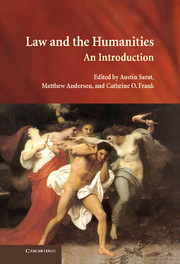Book contents
- Frontmatter
- Contents
- Contributors
- Acknowledgments
- Introduction: On the Origins and Prospects of the Humanistic Study of Law
- I PERSPECTIVES ON THE HISTORY AND SIGNIFICANCE OF SCHOLARSHIP IN LAW AND THE HUMANITIES: THREE VIEWS
- 1 A Humanities of Resistance: Fragments for a Legal History of Humanity
- 2 Three Tales of Two Texts: An Introduction to Law and the Humanities
- 3 Law, Culture, and Humility
- II IDEAS OF JUSTICE
- III IMAGINING THE LAW
- IV LINGUISTIC, LITERARY, AND CULTURAL PROCESSES IN LAW
- V INSTITUTIONAL PROCESSES
- Index
- References
2 - Three Tales of Two Texts: An Introduction to Law and the Humanities
Published online by Cambridge University Press: 20 January 2010
- Frontmatter
- Contents
- Contributors
- Acknowledgments
- Introduction: On the Origins and Prospects of the Humanistic Study of Law
- I PERSPECTIVES ON THE HISTORY AND SIGNIFICANCE OF SCHOLARSHIP IN LAW AND THE HUMANITIES: THREE VIEWS
- 1 A Humanities of Resistance: Fragments for a Legal History of Humanity
- 2 Three Tales of Two Texts: An Introduction to Law and the Humanities
- 3 Law, Culture, and Humility
- II IDEAS OF JUSTICE
- III IMAGINING THE LAW
- IV LINGUISTIC, LITERARY, AND CULTURAL PROCESSES IN LAW
- V INSTITUTIONAL PROCESSES
- Index
- References
Summary
Scholars in “Law and the Humanities” create meaning by examining texts that lie outside the formal confines of the law. They then relate these texts, often through narrative conceptualizations, to the work of the law – be it the focused activity of adjudication or the broader field of legality and its social and cultural manifestations. In this chapter I introduce this body of work, by taking a similar methodological path. I begin by focusing on two nonlegal texts; I then offer a series of narratives that connect these texts, not with the work of the law per se, but with the trajectory of this shifting, flourishing field.
The first text is Herman Melville's novella, Billy Budd, Sailor: An Inside Narrative. This canonical text concerns an act of judgment on the Bellipotent, a nineteenth-century vessel of Her Majesty's Navy. A false accusation of mutiny triggers an act of violence by a handsome and greatly beloved young sailor. The ship's captain must decide whether to impose the law's most stringent command on a man who is depicted as characterologically innocent and perhaps even circumstantially excused. Although its subtle elaboration of character and inconsistencies of narration bring to the tale the illuminations and provocations of literature, the novella unfolds in a vein of sober and painful realism. This realism is, transparently, about the command and the application of the law. Billy Budd traverses act, accusations, arguments to a drumhead court, and the issuance and execution of a sentence.
- Type
- Chapter
- Information
- Law and the HumanitiesAn Introduction, pp. 73 - 97Publisher: Cambridge University PressPrint publication year: 2009



